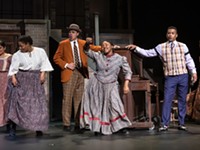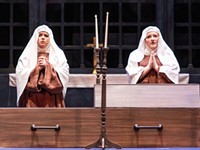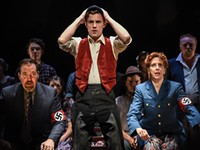[
{
"name": "500x250 Ad",
"insertPoint": "5",
"component": "15667920",
"parentWrapperClass": "",
"requiredCountToDisplay": "1"
}
]
Family dramas have done incredibly well onstage in the last decade -- "August: Osage County" and "Next to Normal" are great examples -- winning Pulitzer Prizes and Drama Desk Awards and giving audiences a chance to escape from their own private lives into the fictional problems of another familial unit. And really, who doesn't enjoy that?
These types of shows are often powered by small casts and take place primarily in a set that depicts the family's living room or kitchen. It's the kind of show every producer wants in a season -- often it's a new work -- and can provide a platform for strong actors who excel in emotional dialogue.
JCC CenterStage, under the artistic direction of Ralph Meranto, actively seeks out these sorts of productions. "Other Desert Cities," the latest offering from the CenterStage, is one such show.
"Other Desert Cities" is the eighth work by Jewish playwright Jon Robin Baitz, opening off-Broadway in 2011 and transferring to Broadway within the year. It was also a finalist for the 2012 Pulitzer Prize for Drama and nominated for the 2012 Tony Award for Best New Play, though it didn't win either.
The story follows the Wyeth family on Christmas Eve 2004 in Palm Springs, California. Daughter Brooke Wyeth, a writer who now lives in Long Island and hasn't visited in six years, has returned to spend the holidays with her pro-GOP, old-Hollywood money parents, Lyman and Polly, as well as her younger brother, Trip, a reality TV producer, and her alcoholic aunt Silda Grauman, a former TV writer. As is expected from this genre, there is a family secret revealed throughout the course of the play, prompted by Brooke's plans to publish a memoir surrounding the suicide of her older brother, Henry, which happened in the 1970's.
The audience's first impression of the play is the set, a chic living room that's modeled around mid-century architecture with touches of California's airy style. Since the entire play takes place in this room, designer Shelly Stam has painstakingly created a set that feels luxurious and believable -- from the glowing fireplace to the crystal decanter of vodka. (It should be noted that this is Stam's first set design, and it's an absolute triumph.) Stam also creates a natural aesthetic with her costume design, which feels tailored to each character's tastes, from Polly's sweaters and flashy jewelry to Silda's silky kimono. Lighting designer Tom Habecker plays off the warmth of the set to add desert tones befitting a Palm Springs morning and sunset.
Director David Runzo, a familiar fixture in the local theater scene, directs five actors in this piece to varying degrees of success. Returning to the JCC stage again this year is Davida Bloom (Silda), who also appeared in "Coney Island Christmas." Bloom is always a delight to watch onstage, as she gives herself fully to each role and provides reactionary dialogue for each of her co-stars. (As the alcoholic, raving Silda, she's almost too convincing.)
Appearing at the JCC since 1982, Fred Nuernberg (Lyman Wyeth) returns as well. Though his movements and delivery felt a bit wooden at times, he's every bit the aging Hollywood star with his regal posture and measured diction. Danny Kincaid Kunz plays Trip, the youngest Wyeth child, a would-be peacemaker with a few secrets of his own. Kunz, who's also a local improv actor, is a bit frantic and underwhelming in both his delivery and movements, but he carries off several passionate lines nicely (in particular, his last monologue).
Marlo DiCrasto (Brooke Wyeth) and Patricia Lewis Browne (Polly Wyeth) portray the roles that provide not only much of the plot's emotional foundation, but also its rising action. In the role of the matriarch, Browne is a natural fit. Her facade of control and her relationship to each character is laid out from the top of the show, and Lewis immerses herself in the character's journey. For DiCrasto, this was not the case.
Though the show might be considered an ensemble piece, DiCrasto's character provides the catalyst in the plot -- it's important that the actor playing this role is the strongest performer onstage. Unfortunately, there were many moments in the show when DiCrasto delivered a simply average performance, at best. At times it felt as though she was reciting lines, rather than connecting them back to the recipient or her own emotions. Perhaps the most excruciating moment was when DiCrasto's character realizes the family secret and reacts. Her physical choice in that moment -- which may have been a stage direction -- completely detracts from the gravity of the denouement.
In "Other Desert Cities," Baitz has provided a moving, brilliant script for actors to build upon -- but if there isn't an emotional connection (or, in DiCrasto's case, basic reactions during important dialogue), the power of the show will not translate. Actors must be the conduit between script and audience.
EDITOR'S NOTE: This article has been corrected. Fred Nuernberg has been appearing onstage at the JCC since 1982.
Speaking of...
Latest in Theater
More by Leah Stacy
-
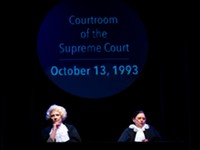
Theater Review | 'Sisters In Law'
Apr 12, 2024 -

Out from under
Mar 20, 2024 -
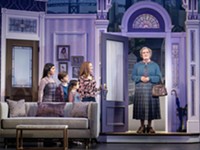
Theatre Review | 'Mrs. Doubtfire'
Feb 21, 2024 - More »

